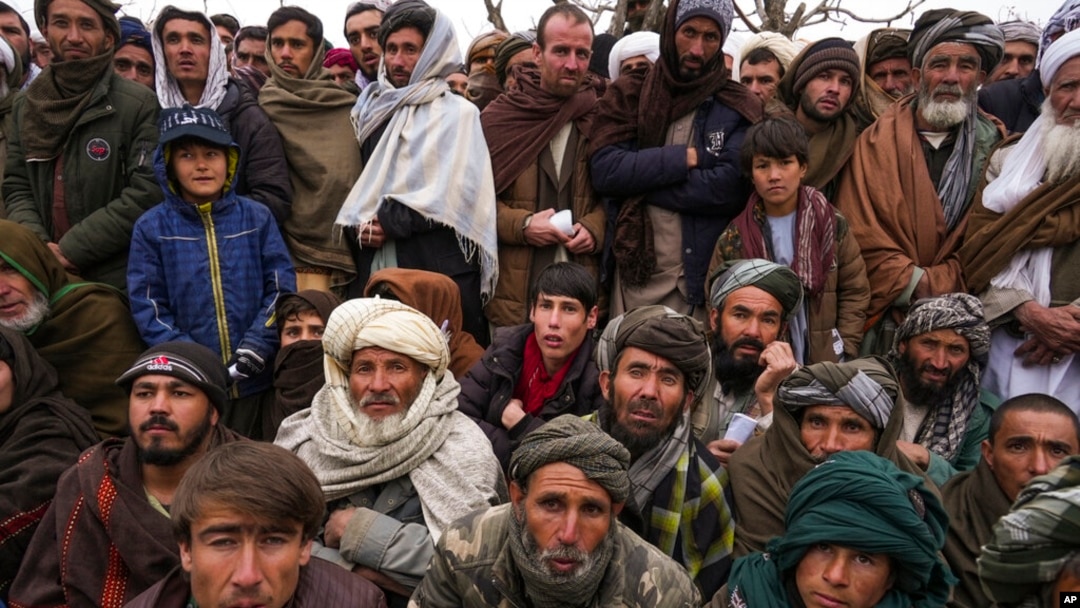The U.N. secretary-general warned on Wednesday that Afghanistan is "hanging by a thread," as the organization appealed for a total of $8 billion to scale up humanitarian assistance to more than 22 million Afghans this year.
"When it comes to complex humanitarian emergencies, Afghanistan is as bad as it gets," Antonio Guterres told a meeting of the U.N. Security Council.
Afghanistan's economy has been in a free fall for months, there is a severe drought, and a brutal winter has descended on the country, exacerbating daily suffering.
The Taliban, which seized power nearly six months ago, are cut off from billions of dollars of the former government's assets that are frozen abroad as the international community waits to see how they will behave.
In the meantime, the United Nations and its partners are trying to meet growing humanitarian needs. Two weeks ago, the organization said it required $4.4 billion for its aid response. On Wednesday, it launched what it says is a complementary appeal for $3.6 billion to fund essential social services, including health and education, and maintain basic infrastructure. In all, a staggering $8 billion to keep the population from catastrophe.
Sanctions call
The U.N. chief also appealed to the international community to suspend restrictions that are hurting Afghanistan's economy.
"We need to give financial institutions and commercial partners legal assurance that they can work with humanitarian operators without fear of breaching sanctions," Guterres said.
He urged the release of frozen currency reserves and re-engaging with the country's central bank, as well as foreign cash injections for the ailing economy.
"Time is of the essence. Without action, lives will be lost, and despair and extremism will grow," he warned. "A collapse of the Afghan economy could lead to a massive exodus of people fleeing the country."

FILE - U.S. Ambassador to the United Nations Linda Thomas-Greenfield speaks to reporters during a news conference at United Nations headquarters, March 1, 2021.
The United States has frozen about $9 billion in Afghan reserves, and Ambassador Linda Thomas-Greenfield said Washington is looking at options to ease the cash crunch.
"Ultimately, a functioning Afghan economy will require an independent and technically competent central bank that meets international banking standards," she said. "While Afghan Central Bank reserves held in the United States are subject to ongoing litigation, we recognize calls to examine making available reserves to help the people of Afghanistan."
Mixed reviews
The U.N.'s top diplomat in Afghanistan, Deborah Lyons, said the Taliban have taken some positive actions to function more effectively as a government, including agreeing on a budget financed by their own revenues, paying some government salaries and making efforts to engage the private sector. They are also working with UNICEF to reopen schools for both boys and girls in March.
"On the other hand, here on the ground there is compelling evidence of an emerging environment of intimidation and a deterioration in respect for human rights," she said from Kabul. "This suggests that the consolidation of government authority may be leading toward control of the population by fear, rather than by understanding and responding to its needs."
FILE - Afghan women shout slogans during a rally to protest Taliban restrictions on women, in Kabul, Afghanistan, Dec. 28, 2021.
Lyons said that despite Taliban declarations of general amnesties for those who worked for or defended the former government, the U.N. continues to receive credible allegations of killings, enforced disappearances, detentions of political opponents and civil society representatives.
"After 20 years of tasting freedom — working, studying, playing sports, performing music — it has taken less than six months to completely dismantle the rights of the women and girls across the country," Afghan human rights defender Mahbouba Seraj said, telling the Security Council they must keep promises made to Afghan women over the years.
Taliban
The Taliban is not an internationally recognized government, and the country's seat at the United Nations is still held by the former government. But the Ashraf Ghani-appointed envoy quietly resigned in December, and a deputy is now heading the Afghan mission.
Naseer Faiq said he does not represent the views of either the former government or any political group. He urged the international community to provide humanitarian assistance and help with the economic crisis, and he called on the Taliban to end human rights violations, honor their general amnesty, and let women work and girls go to school and university.
Pakistan, which has been close to the Taliban over the years, said it would be more useful if a Taliban representative could address the council. They have designated their spokesman in Qatar, Suhail Shaheen, to be their U.N. envoy, but the general assembly committee that approves credentials of representatives deferred a decision, leaving the status quo in place.
On other outstanding issues, Pakistan's envoy said engagement is required.
"It is only through dialogue, through consultations and mutual persuasion that we will be able to achieve agreed outcomes," Ambassador Munir Akram said. "Coercion is not the road to peace in Afghanistan. It has not been for the past 20 years, and it will not be in the future."


